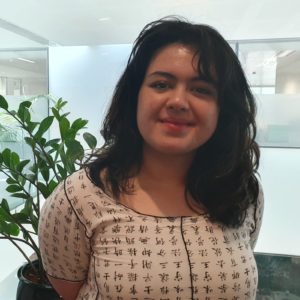 Day One
Day One
My morning had begun, similarly to how astronomers look at their work, exciting, daunting and abundantly rewarding. Meeting Pikky and Kat, I was lead to the first person, of which I would have the pleasure of gaining insight into their work here at ICRAR, Danny.
He discussed with us the basics of Pulsars. With this new found knowledge, Danny helped us write some code using data about pulsars to make matrixes of data, which developed a 3-D model detailing the location of pulsars in outer-space.
Next we talked to one of our guides Kat, and she gave us an overview of the fundamentals of astronomy, more specifically radio-astronomy. Straight after this we sat in on a students 18-month review, in which he discussed his research on; ‘Searching for the synchrotron and researching the cosmic web’.
Day two
We finally meet our pen-pal, Greg, and collect some information booklets on ICRAR UWA. First up was a presentation with Kevin Vinsen on the SKA and Astronomy. In this we reconsolidated our knowledge of the fundamentals and got a little more insight into the up and coming project SKA (square kilometre array). Then we talked to Danail, an astrophysics PhD about his journey though the world of astrophysics and international study. Having a brief discussion with Steve about the Kosler effect, SpaceX, and other up and coming theories and projects within the astrophysics and cosmology arena, for our last activity of the day.
Day Three
Today, back at Curtin we started our day talking to Ben about noise in graphing and graphing radio waves, as well as how we see galaxies due to star light. As well as the affect telescope resolution and distance has on your wealth and depth of information.
We had also discussed some more information on Gamma Pulses and how that is related to neutron stars. We ended our day with a discussion about Black Holes with Pikky, including information on how there are 3 types of black holes; small, large and intermediate, and the density of black holes. We also calculated how far away a black hole was using basic trigonometric functions.
Day Four
On our last day at Curtin, we endeavoured to learn about the Engineering side to ICRAR. With our first meeting being with Budi, a Electrical Engineer at Curtin’s ICRAR office. He discussed with us the aspects of his day-to-day job with data processing, building frequency sensitive machinery, and general coding. We had a look at some of the machinery used in the engineering process, this including; heat chambers and low frequency amplifiers. Then we headed over to the PhD area, and had a conversation with Mike and Bella about the epoch or reionisation, the big bang, the MWA, and the Extra Galactic Foreground.
Then talking to Kathryn about her work with small irregular galaxies, and deciphering between the youth or frustration astronomical theorems as causes for these particular galaxies. Next, we talked to Daniel, an engineer at ICRAR concerned with the graphing results of the MWA and creating simulations. Lastly, we talked to Clancy, a professor at Curtin, and one of four experts in his field internationally. With him we discussed Black Holes, Neutrinos and other interesting astronomical news as of late. We said our temporary farewells to our beloved friend ICRAR Curtin, and ensured we would be back one day.
Day Five
We started our day with going onto UWA campus and observing the SPIRIT telescope, currently located on Campus. Then ate to our hearts’ content at the weekly Morning Tea. Then talked to Brent about the variations of work in astrophysics, including astro-chemistry and astro-biology. Plot-of-the-week was the next event, here we listened in on some of the new research coming out in Astronomy, and as the title suggests, some of the staff’s favourite graphs. We also got to know Ruby and Robin, two PhD students at ICRAR. We later weighed a galaxy with Robin, this involved some intensive logic and simple mathematics. We discussed the role of simulators in astronomy with Lucy. And here we were, at the end of our work experience, what a life-moulding experience.
For me personally, this week at ICRAR has truly sparked an even deeper intrigue in astronomy, engineering and physics, that I think wouldn’t have eventuated without this work experience. I would definitely recommend this work experience opportunity to anyone interested in science, mathematics or anyone unsure of what they would like to do in the future. This experience has heightened my excitement to study and pinpointed my ambitions. Thank you ICRAR, and all the amazing people I have met this week.